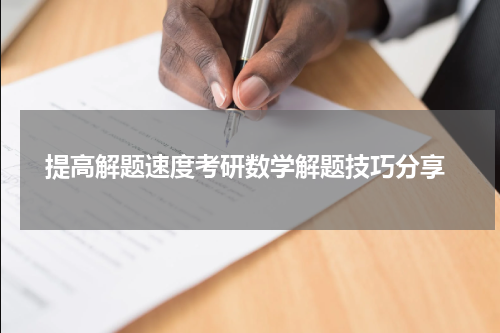1.Familiarizeyourselfwithcommonmathformulasandrules:Byknowingkeyformulasandrulesinvariousbranchesofmath,youcanquicklyidentifytheappropriatestrategyorapproachtosolveaproblem.Thiswillsaveyoutimeinthinki

1. Familiarize yourself with common math formulas and rules: By knowing key formulas and rules in various branches of math, you can quickly identify the appropriate strategy or approach to solve a problem. This will save you time in thinking about how to begin solving the problem.
2. Practice mental math: Improve your mental math skills by practicing calculations in your head. This will help you solve problems more quickly without relying heavily on calculators or writing out each step.
3. Use shortcuts and approximation techniques: In some cases, you can save time by using shortcuts or approximation techniques. For example, if you need to multiply two numbers, you can round them to the nearest 10 or 100 and then adjust the final answer accordingly. This can save you time in lengthy calculations.
4. Look for patterns or symmetries: Often, math problems involve patterns or symmetries that can help you simplify the problem or determine the answer more easily. Train yourself to recognize patterns and symmetries in math problems to quickly identify solution methods.
5. Break down complex problems into smaller, more manageable parts: Some math problems can be quite complex and overwhelming. Break them down into smaller parts or sub-problems that are easier to solve. Then, combine the solutions to arrive at the final answer.
6. Work on your speed and accuracy simultaneously: While it is important to solve problems quickly, it is equally important to maintain accuracy. Practice solving problems under time constraints to improve both speed and accuracy. Gradually reduce the time limit to push yourself to think and solve problems faster.
7. Learn different problem-solving techniques: Expand your problem-solving toolkit by learning different techniques and strategies for solving math problems. This will help you approach a wider range of problems more efficiently.
8. Review past test papers: The more you familiarize yourself with the types of questions asked in the exam, the better prepared you will be. Review past test papers and identify common question patterns or topics that frequently appear. This will help you prioritize your study efforts and solve similar problems more quickly during the actual exam.
9. Stay organized and manage your time effectively: During the exam, it is crucial to manage your time effectively. Allocate time for each question based on its difficulty level and marks assigned. Avoid getting stuck on a single difficult problem and move on to others. Circle back to unresolved questions later if time permits.
10. Practice regularly: Consistent practice is key to improving your math problem-solving skills and speed. Set aside dedicated time every day or week to solve math problems. The more you practice, the faster and more efficient you will become in solving math problems.










